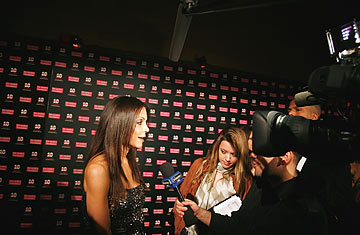
Bethenny Frankel attends the Candie's Foundation 2011 benefit gala at Cipriani 42nd Street in New York City on May 3, 2011
Vulgar, vulnerable, wise and neurotic, Bethenny Frankel, Bravo's last-minute addition to its blockbuster series The Real Housewives of New York City, was a poor man's Housewife from the first. Not a wife (single Frankel was expanding her catering business) nor a homeowner (she rented her Upper East Side one-bedroom), she weathered patronizing barbs from older, wealthier castmates for these and other deficiencies with a captivating mix of insouciance and insecurity.
Ah, how the Juvederm has turned. Now, while former castmates struggle to comfort themselves on camera with a smidgen of dignity, Frankel is a cottage industry. Her Skinnygirl Margarita drink, which debuted on The Real Housewives of New York City, was just sold to a distributor for $120 million. Her Skinnygirl diet-advice books are New York Times best sellers. She's expanding into lingerie, skin care and self-help books (see her latest, A Place of Yes, in stores near you). She has some 567,000 followers on Facebook and half a million on Twitter. And every step of her rise — especially the eleventh-hour arrival of a Mr. Right, Jason Hoppy, and their unplanned baby girl, Bryn — has been chronicled on two solo spin-offs on Bravo, Bethenny Getting Married? and Bethenny Ever After. (The season finale of Bethenny Ever After airs Monday.)
Why there was ever a doubting question mark on Bethenny Getting Married? is up for debate, though one might blame those pesky, undermining Real Housewives castmates. One of the great hilarities of the show was watching Frankel — youngest, skinniest, arguably prettiest, her career advancing by the minute — bullied mercilessly by women who were forced to renew vows, restock closets and redecorate to garner equal camera time. Informed breezily by Ramona Singer that best friend Jill Zarin only liked her because she liked to root for the "underdog," Frankel incredulously told the cameras, "I hadn't realized I was this deformed, undateable human being." When Frankel was chosen for the cover of Social Life magazine, former model Countess LuAnn de Lesseps' well-placed dart — "Are they going to airbrush you?" — hit home. Visibly rattled, Frankel tried vainly to pry an apology out of this blithe Cruella over an excruciating lunch. The ingenue couldn't see garden-variety jealousy when it smacked her with her own rising star. But viewers (and savvy producers) could.
The Real Housewives transaction is simple. Politely entertaining the fiction that Housewives are persons of import, Bravo, in exchange for the women's emotional antics, showcases everything from staged dinner parties to ludicrously trumped-up charity ventures. So what if fashion line She by Sheree (from Atlanta Housewife Sheree Whitfield) never materializes? That the "marketing meeting" for the Countess's book is its only marketing? That the single "Tardy for the Party" (from Atlanta's Kim Zolciak) is a hit because she can't sing? No matter: someone will get her wig yanked off before this party ends.
But Frankel, a runner-up on The Apprentice: Martha Stewart, always saw reality TV as a practical place to showcase her real ventures (such as the burgeoning Skinnygirl line) as well as her real story: an up-from-therapy rise from troubled child of a gritty jockey and absentee mother to mother and wife herself. Unlike the other Housewives' feeble stabs at self-commodification (such as de Lesseps' book Class with the Countess, an attempt to capitalize on her brand of prudish charm), Frankel's psyche and product are intertwined. On a tense Atlanta Housewives reunion show, attorney Phaedra Parks silenced the indefatigable NeNe Leakes with this shattering charge: "Your only claim to fame is this show." For Frankel, having the show as a claim to fame was a welcome gimme. Who else but the angular star was the best proof for her Skinnygirl line?
Frankel's career (and its $120 million payday) has become a wormhole that might give media theorist Marshall McLuhan a pause: she's a star on a successful reality show about being a star on a successful reality show. While other Bravo Housewives struggle to prove to viewers that they have lives, Frankel understands that her life is her viewer. Forget bath time with Bryn: perched on a thronelike chair at the center of her dining room, she's endlessly made up for events to "feed the beast." What most of us would consider "real" activities — seeing in-laws, showing off Bryn at her nanny's church, her own birthday party — freaks Frankel out. She's more comfortable thanking fans for voting for her on Skating with the Stars, telling Hoppy she's ready to "crack skulls" over the poor distribution of the Skinnygirl Margarita line or in the arms of her Facebook commentariat — whom she joined, as her disastrous 40th birthday aired, to ask if they noticed the shapewear she was wearing.
The Frankel fans — who will likely never appear on two reality shows at once, release a best-selling diet series or find such a camera-ready Mr. Right as Hoppy — can nonetheless identify with the star, as the endless threads on child-rearing, dieting, marriage and fashion on Frankel's Facebook page attest. Why? Perhaps it's because Frankel, unlike her co-stars, never conceived fame as an end in itself. We don't choose Skinnygirl Margarita over Class with the Countess because the product is better. (Trust me.) But Frankel as a product is better, not least because she combines her antic persona and belief in her product line with a genuine gratitude for her fans, to whom A Place of Yes is dedicated.
But who needs a memoir in print when it's happening live? Even as Frankel hits the jackpot, she's tearful, incredulous and grateful, an underdog done good. How she handles Bethenny on Top? is the next question mark.
